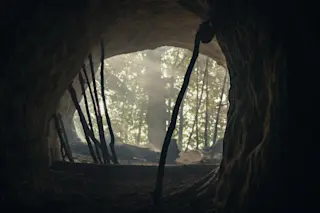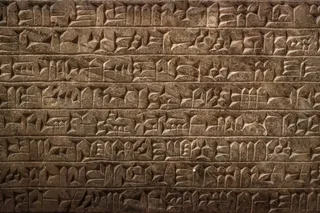The routes that our ancestors followed out of Africa have been long debated. But now researchers have uncovered evidence that the so-called northern route — a traverse that took Homo sapiens from the Sinai Peninsula into the Jordan Rift Valley — might have been a particularly viable corridor during the last interglacial period, which persisted from about 129,000 to 71,000 years ago.
Sediments unearthed at three sites in southern Jordan suggest that wetland conditions likely persisted there during that time. A water-rich landscape would have provided ample food resources in the form of both plants and animals for migrating humans.
Rock Formations, Not Waterfalls
Today, much of southern Jordan is a desert. It’s a landscape known not for its waterfalls but, rather, for its rock formations; the famed archaeological site of Petra is literally built into the red sandstone that abounds in the region.
The climate is hot and arid, said Mahmoud Abbas, a quaternary geologist at Shantou University in Shantou, China, and a Jordanian by birth. “The mean annual precipitation is 100 millimeters per year.”
But perhaps the climate in the region, which is part of an area known as the Levant, was far different in the past — that’s what Abbas and his colleagues set out to investigate.
If southern Jordan was once wetter, for example, the region might have functioned as a migration corridor for humans leaving Africa. Wetter conditions in the Levant would have resulted in plentiful sources of food to sustain Homo sapiens on the move, said Zhongping Lai, a geologist at Shantou University and a member of the research team. “With water and vegetation, animals will be there.”
North or South?
Early modern humans may have migrated out of Africa and into the Levant during the Pleistocene through southern or northern routes, as indicated by speleothem records, paleoclimate records, paleontological sites with fossils of Homo sapiens, and archaeological sites with stone tools.
Roughly 85,000-year-old fossilized human bones have been found in Saudi Arabia — southeast of the Levant on the Arabian Peninsula — but the route Homo sapiens took to get there is unclear.
“There [are] two possible routes out of Africa,” explained Jon Hill, a numerical environmental scientist at the University of York in the United Kingdom not involved in the research. The northern route, via the Sinai Peninsula and the Levant, is entirely over land. The southern route, on the other hand, crosses the Red Sea. “You’d be sailing for quite a while,” said Hill. The fossil evidence is inconclusive when it comes to pinpointing which traverse was favored by our ancestors, however.
Between 2017 and 2020, Abbas and his colleagues made three trips to the Levant to investigate. They focused on two sites in the Jordan Rift Valley at elevations of roughly 50 and 270 meters above sea level and one site on the Jordanian Plateau at an elevation of about 800 meters above sea level.
The team did most of its fieldwork in the summer. Temperatures routinely topped 40°C, Abbas said, and gusts of wind regularly whipped up the desert dust.
But in the harsh landscape, the researchers found pebbles, cobbles, and boulders in addition to sand and silt and sediments rich in organic matter. Some of the material furthermore contained traces of plant roots and other evidence of long-ago vegetation. Abbas and his collaborators concluded that wetland conditions once persisted in the area. Indeed, faint outlines of long-ago lakes have been spotted in the region.
However, the big question was when all that moisture was present. To dig into that mystery, the team pushed stainless-steel cylinders roughly the size of paper towel tubes into exposed sections of sediment. With the tubes full, the researchers capped the ends to prevent the samples from being exposed to light.
Mind the Light
At Shantou University, the researchers worked under dim red light as they extracted the sediments from each tube. The unusual lighting conditions were necessary because the material was going to be dated using optically stimulated luminescence. That technique reveals how much time has elapsed since minerals such as quartz and feldspar in the sediments were last buried, Lai said. “It dates the event of last light exposure.”
The team recorded dates ranging from 115,000 to 45,000 years ago. Those numbers are consistent with the ages of fossilized human bones and footprints discovered in the nearby Nefud Desert, the team noted. Furthermore, they overlap with the growth periods of speleothems found in a cave roughly 100 kilometers to the northwest. (Stalagmites and stalactites grow in the presence of water — these cave formations are literally built up over time from minerals dissolved in water.)
The confluence of archaeological evidence, such as stone tools, and paleoenvironmental and paleoclimatic data suggests that Homo sapiens did, indeed, traverse a northern route across the Sinai Peninsula into modern-day Israel and Jordan on their way out of Africa, the team reported in Science Advances.
These findings make sense, Hill said, but they certainly don’t rule out the southern route as another way out of Africa. “Humans probably did both,” he said. “We’re quite an ingenious species.”
This article was originally published by Eos.














